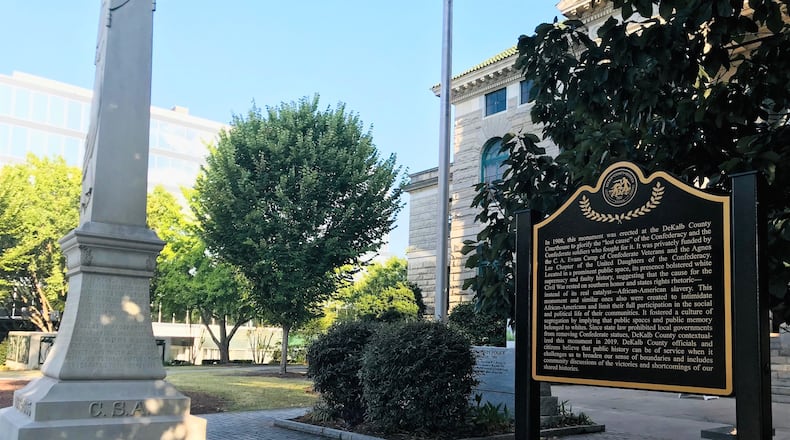A work crew blasted through solid clay, dug two holes and poured concrete to prep the site. The next morning, they returned and installed a plaque DeKalb County officials say tells the real history of the Confederate monument in Decatur Square.
And now, that historical marker is receiving praise from afar for its truth-telling about the “lost cause” movement and the factual history of the Civil War.
"Now this is how to do it," Washington & Lee University history professor Michelle Brock wrote on Twitter. "Honest, effective public history does not pull punches. When monuments to the Lost Cause & white supremacy cannot be removed, they need to be called what they are."
DeKalb County commissioners had tried to move the monument all together. But state law made that nearly impossible, so in March they approved a different remedy: installing a marker to add historical context about why the monument exists in the first place.
Commissioners approved the language for the marker and allocated $3,000 to get it built and installed. The 300-pound, one-inch thick bronze plaque will be placed just a few feet away from the monument, facing the same side of its most objectionable language about Confederate soldiers "of a covenant keeping race."
Read more | DeKalb’s Confederate monument to receive contextualizing marker
Also | Still no takers, but DeKalb says Confederate monument will move
The 184-word statement on the marker says the monument, built in 1908, is a symbol of white supremacy, segregation and intimidation.
“Located in a prominent public space, its presence bolstered white supremacy and faulty history, suggesting that the cause for the Civil War rested on southern honor and states rights rhetoric—instead of its real catalyst—American slavery,” the marker reads. “This monument and similar ones also were created to intimidate African Americans and limit their full participation in the social and political life of their communities.”
DeKalb County Commissioner Jeff Rader, who serves as the presiding officer, says the contextualizing marker is long overdue. He and Commissioner Kathie Gannon led the campaign to get it approved and installed.
“We hope when people notice and observe the monument that we also give them a history lesson on the people and times that were involved in its direction more than a century ago,” Rader said. “DeKalb was a different place back then. We won’t be the county that we want to be until we tell our history truly and completely.”
His colleague, Mereda Davis Johnson, is less impressed. She believes the commission should work to change state law to make it easier for them to relocate the Confederate monument to a less prominent place in the county.
“Contextualization of a racist statue represents progress, but not victory,” Johnson said in a statement. “Shame on the Georgia Legislature for forcing local governments to leave in place racist symbols that offend local taxpayers. The battle continues until this ugly symbol of a racist past is removed from the public square.”
Fast Signs of Tucker was hired to create and install the marker, and two of its employees began the process Thursday afternoon by prepping its base. They left it overnight to allow the concrete to set, surrounding the site with yellow caution tape and signs that said, “historical plaque installation site.”
County leaders have not planned for any ceremony to officially unveil the marker. Instead, they pushed to ensure it was installed ahead of Wednesday's Interfaith Commemoration Service, the public kickoff of the NAACP-led initiative to acknowledge lynchings that occurred in DeKalb and the county's legacy of racial terrorism.
Attendees to Interfaith Service, which will be held in the old DeKalb Courthouse, will now pass by both the Confederate monument and the contextualization marker when they head inside.
Read more | Effort in DeKalb County seeks to honor black victims of lynchings
Also | DeKalb's 'Journey of Remembrance' begins with Interfaith Service
What the marker says
“In 1908, this monument was erected at the DeKalb County Courthouse to glorify the ‘lost cause’ of the Confederacy and the Confederate soldiers who fought for it. It was privately funded by the C.A. Evans Camp of Confederate Veterans and the Agnes Lee Chapter of the United Daughters of the Confederacy. Located in a prominent public space, its presence bolstered white supremacy and faulty history, suggesting that the cause for the Civil War rested on southern honor and states rights rhetoric—instead of its real catalyst—American slavery. This monument and similar ones also were created to intimidate African Americans and limit their full participation in the social and political life of their communities. It fostered a culture of segregation by implying that public spaces and public memory belonged to Whites. Since state law prohibited local governments from removing Confederate statues, DeKalb County contextualized this monument in 2019. DeKalb County officials and citizens believe that public history can be of service when it challenges us to broaden our sense of boundaries and includes community discussions of the victories and shortcomings of our shared histories.”
About the Author
The Latest
Featured




